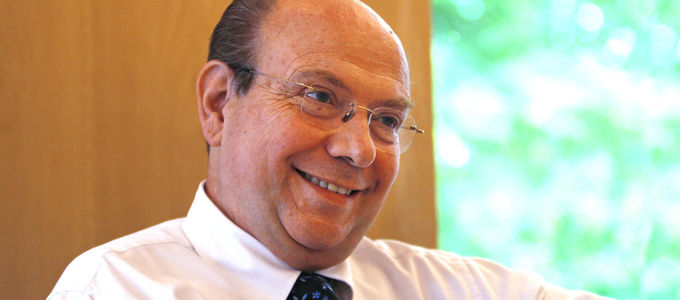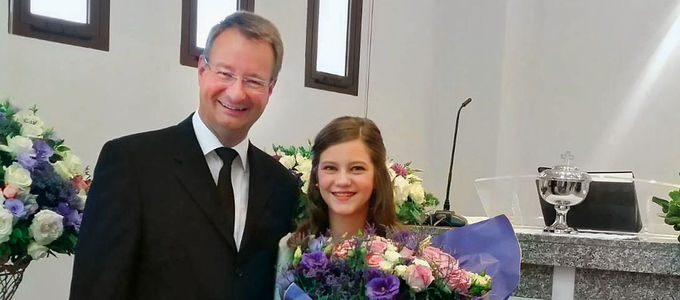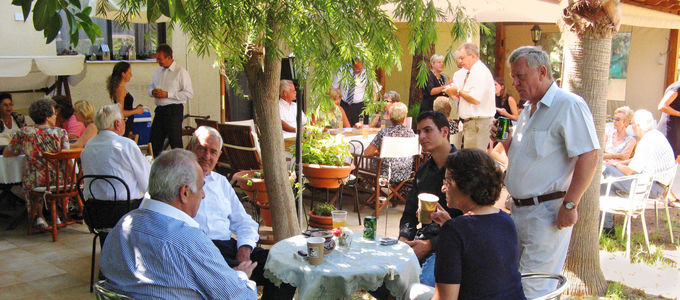
He is at home in two countries, works for the Church on three continents, and speaks six languages: Bishop Aramik Fesdjian has been accustomed to internationality right from the cradle. In this interview he talks about his life between the worlds.
You were born in Lebanon as the son of Romanian parents. What was it that brought your family there?
After the Second World War, my parents fled from Romania as refugees. They wanted to see if they could build a new life for themselves in Lebanon, which was considered the “Switzerland of the Orient” at the time.
You have German citizenship. Do you identify more as German or Lebanese?
Neither one nor the other. My father—who was a Romanian of Armenian descent—taught me to be open to all people, to all nations. He raised me in such a way that I do not feel bound to any particular place or any particular nation.
In which of the countries in your care do you and your wife reside?
Our main residence is in Beirut, but we do have another place in Limassol in Cyprus. When I travel, I prefer to have my wife live in Limassol, because we have had some less than pleasant experiences in Lebanon from time to time.
You speak many languages: Arabic, Armenian, German, English, French, and Romanian. Do you also conduct divine services in all of these languages?
In the past it came more easily to me to learn languages, but now it is no longer as easy. I also tried to learn Greek, but was not able to manage it. I conduct divine services in French (in Lebanon), as well as in English and Arabic.
Do you find your pastoral care work difficult?
I wouldn’t say that. I was born in the Middle East. The conditions there are normal for us. Naturally, not everything is easy, especially in Beirut at the moment. But then I ask myself, “Would you no rather be in Syria or in Beirut?” And then I am very satisfied and grateful again. I have very often experienced God’s help and angel protection. Unfortunately we do not really know how often this is the case.
Do you recall any particularly dangerous situations?
Indeed, there were several such incidents. For example, I can recall one occasion in Beirut in 1982, just before the war between Israel and Lebanon. There was total chaos in Beirut at the time. There was practically no government, no police. And some armed men entered the church in Beirut. As we discovered later on, these men had originally planned to steal our cars and then kill us. As it turned out, all they did was steal our cars, but they did nothing to us.
How do you experience the help of God in such situations?
What I have often experienced—and what I have also heard from our members—is that the help of God often also plays out on the emotional level. For example, there was a war in 2006. It is terrible when airplanes drop their bombs from above. One sister told me, “It was truly horrific, but I nevertheless had a kind of inner peace.” She was certain that this inner peace could be traced back to the many prayers uttered on behalf of our members in this country.
I believe that we experience the greatest divine help on the emotional level. If you are able to stay calm in a very dangerous situation instead of falling into panic, it is already a great help from above. This help does not consist of being safe from all dangers. If that were the case, probably everyone would be New Apostolic, or a Christian in general!
What status does our Church have in the countries in your working area?
With the exception of Egypt, we have official status of some sort everywhere, but not necessarily as a church. In Turkey, for example, we are allowed to operate as the “New Apostolic Foundation”, in other words as an institution of sorts. In Lebanon we are the known as the “League of members of the New Apostolic Church in Lebanon”. We have not been granted status as a church there because if we did have such status, we would have the right to a seat in parliament.
So Christians can practise their faith unhindered in these countries without fear of repression or abuse?
Yes, this is the case at present. There was a certain amount of time when we had to take extra care in Cairo. For example, we never went outside after the divine service, but rather stayed inside the church quarters and would all go home immediately afterward. But this too has passed. In the other countries I have never noticed any problems. In Lebanon, the constitution even enshrines rights for Christians. One does not feel any kind of discrimination as a Christian there.
Do you have any particular guiding principle or motto in life?
I think one should always try to see what one has in common with others, and not what the differences are. One should build upon that which binds, and not focus on that which divides. We experience this in a beautiful way in Lebanon. The churches in Lebanon have very good relationships with one another. And we support one another—we see ourselves as part of a larger Christian family.














